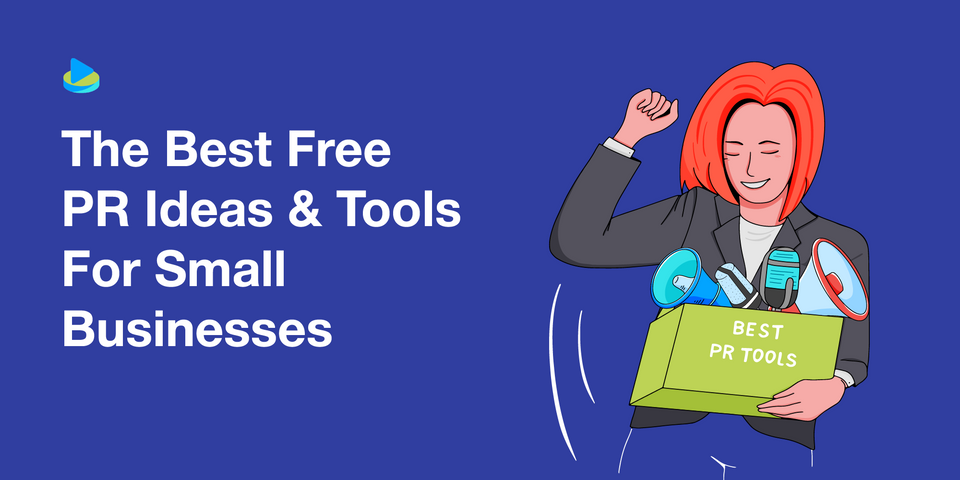Reputation is everything in today's business world, but how can your small business gain and maintain a gold-star rating in public relations?
Good PR takes time and effort. But while you'd love to hand the public relations part of your business over to the professionals, you simply can't afford a PR firm right now. So you've decided to handle it yourself.
Who should you contact, and where should you start looking for free publicity? Should you position yourself as a thought leader? Or concentrate on community events? What are the best PR ideas and tools for small business owners in the 2020s?
We've put together a guide to many of the best PR ideas for small businesses available today. So, let's get started.
Table of Contents
What's the difference between PR and Marketing?
Marketing is all about increasing business sales. A marketing strategy may include paid advertisements on television and other traditional media outlets, social media posts, providing helpful content on your website (content marketing), ads on YouTube and Facebook, sponsoring influential bloggers or podcasts and more. When you're focused on increasing sales, that's marketing.
PR, or Public Relations is all about building your business's positive reputation in the local community and beyond. Good PR creates positive vibes for your small business. Bad PR does the opposite, but in this article, we'll focus on the PR strategies that can help you build people's trust and confidence.
You can't build a solid reputation overnight, but these proven PR tactics can speed up the process.
Best PR ideas for small businesses
An effective marketing plan usually involves some kind of media coverage. Marketing usually focuses on paid or owned media, while PR usually involves earned media, however, the lines are a little blurred. So, what do they mean?
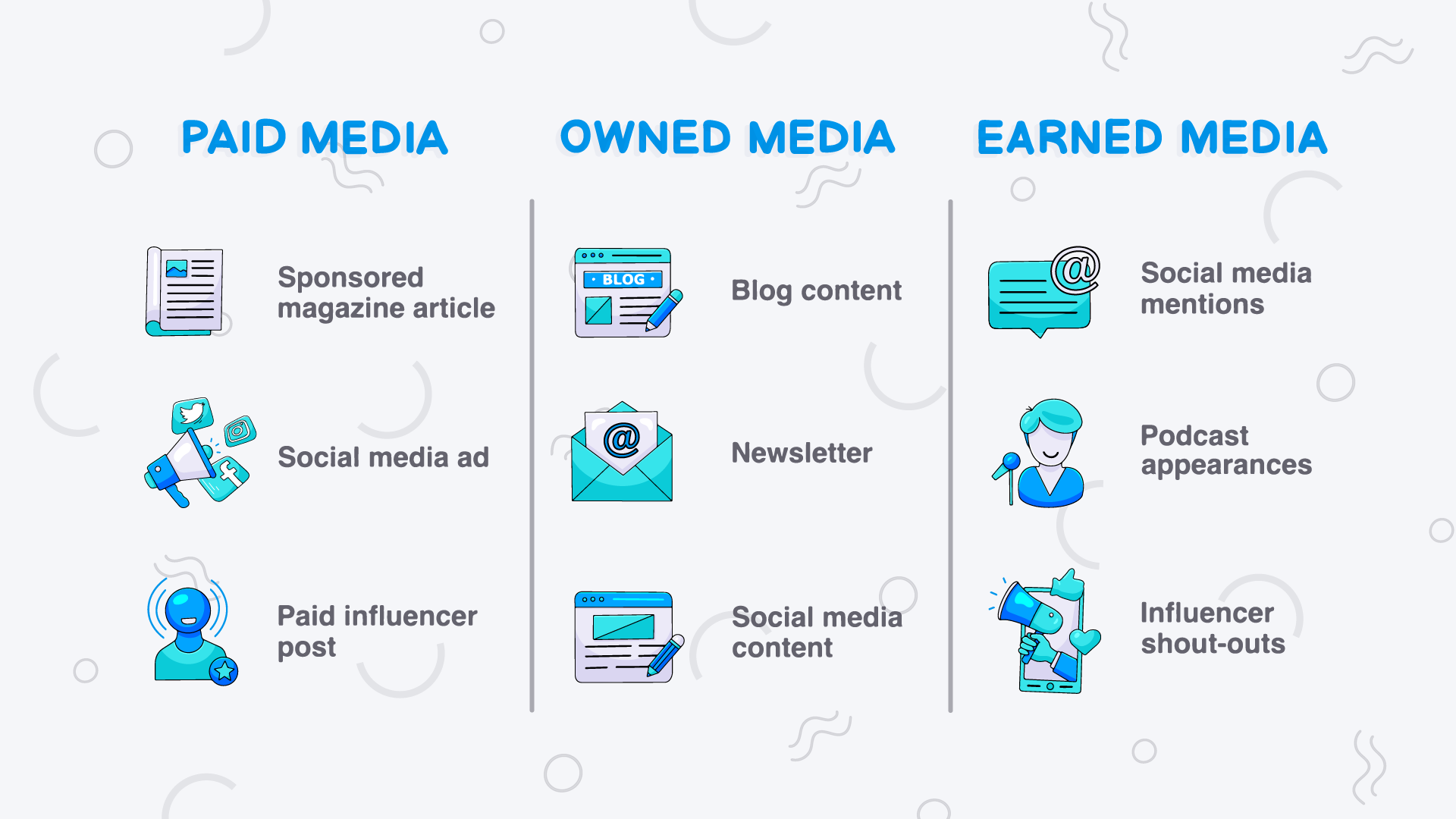
- Paid media - advertising, sponsorship, any media coverage you pay for from your marketing budget.
- Owned media - your website, blog, social media posts, YouTube, podcast - any written, visual or audio content you own and control.
- Earned media - news stories, unsolicited reviews, magazine or blog articles about you or your business, unboxing videos on YouTube, surprise positive mentions on social sites, backlinks to your website, invitations to be a guest on someone else's podcast and so on. These are earned because you've attracted enough positive attention to your business that reporters, bloggers and customers want to tell others about it. People tend to trust things they read, see or hear on earned media more than those on paid and owned media.
Without further ado, here are some free ways your business can gain trust through earned media coverage.
Review sites

Reviews have become integral to buying, with up to 95% of Americans saying they check reviews before they part with their cash. Here are a few of the most popular sites.
Yelp: Crowd-sourced reviews of local businesses, including everything from restaurants and nightclubs to dentists and dry cleaners.
Amazon: Scroll down on any Amazon listing to see people's thoughts on the product. The system automatically prompts buyers to leave a review, but you can also request one within 5-30 days of purchase by scheduling Request a Review. Other online sellers that allow reviews include Facebook Marketplace, Etsy and eBay.
Trip Advisor: Has reviews on all things travel-related, including places to eat, sleep, learn and be entertained. If your business revolves around travel or tourist experiences, people are more likely to book with you if they've read great reviews about your services on TripAdvisor.
Google My Business: Setting up a Google My Business account takes time and effort, but it's worth it. Here's an excellent article that covers everything you need to know.
Earning good media coverage doesn't happen by accident. First, your business needs to deliver excellent products or services and outstanding customer service. How you deal with errors is crucial too. Everyone makes mistakes, but you'll earn great reviews if you bend over backward to fix them.
Press releases

Put some work into establishing a good relationship with your local reporters. That means being personable, accommodating, and generous with your time. If they've had positive, trustworthy interactions with you before, your name will spring to mind when they need a quote or opinion on something in your industry.
Consider joining HARO — Help A Reporter Out — a website that connects reporters with trustworthy sources. HARO's basic plan is free, while the least expensive paid option is 19 USD per month.
Send out press releases to news outlets when you have something genuinely newsworthy happening in your business. There's an art to writing press releases, so read this how-to-guide from Grammarly before you release anything to the news media.
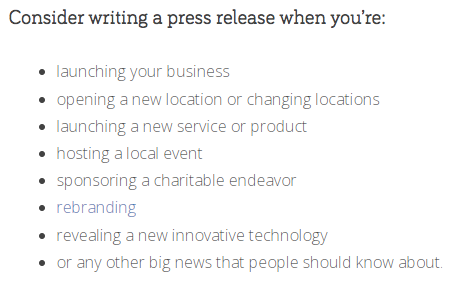
Create a press kit. A good media kit contains crucial stats, names, contact details and other helpful information for reporters and journalists.
Pitch story ideas to local media, journalists and bloggers for website, magazine and newspaper articles or even a slot on the tv news. These could include:
- Something unique you're doing to help the community
- Your innovative solutions to a critical supply shortage in your industry
- News about your latest invention and the problems it solves
- A charity you're involved with
- A round-up of businesses in your area explaining why supporting these small businesses is crucial to the local economy.
- A human interest story involving your industry (and the part your business has played)
- How your new business idea will create growth in the local economy
- How you've used your expertise to solve a local, state or even national problem.
Social media mentions
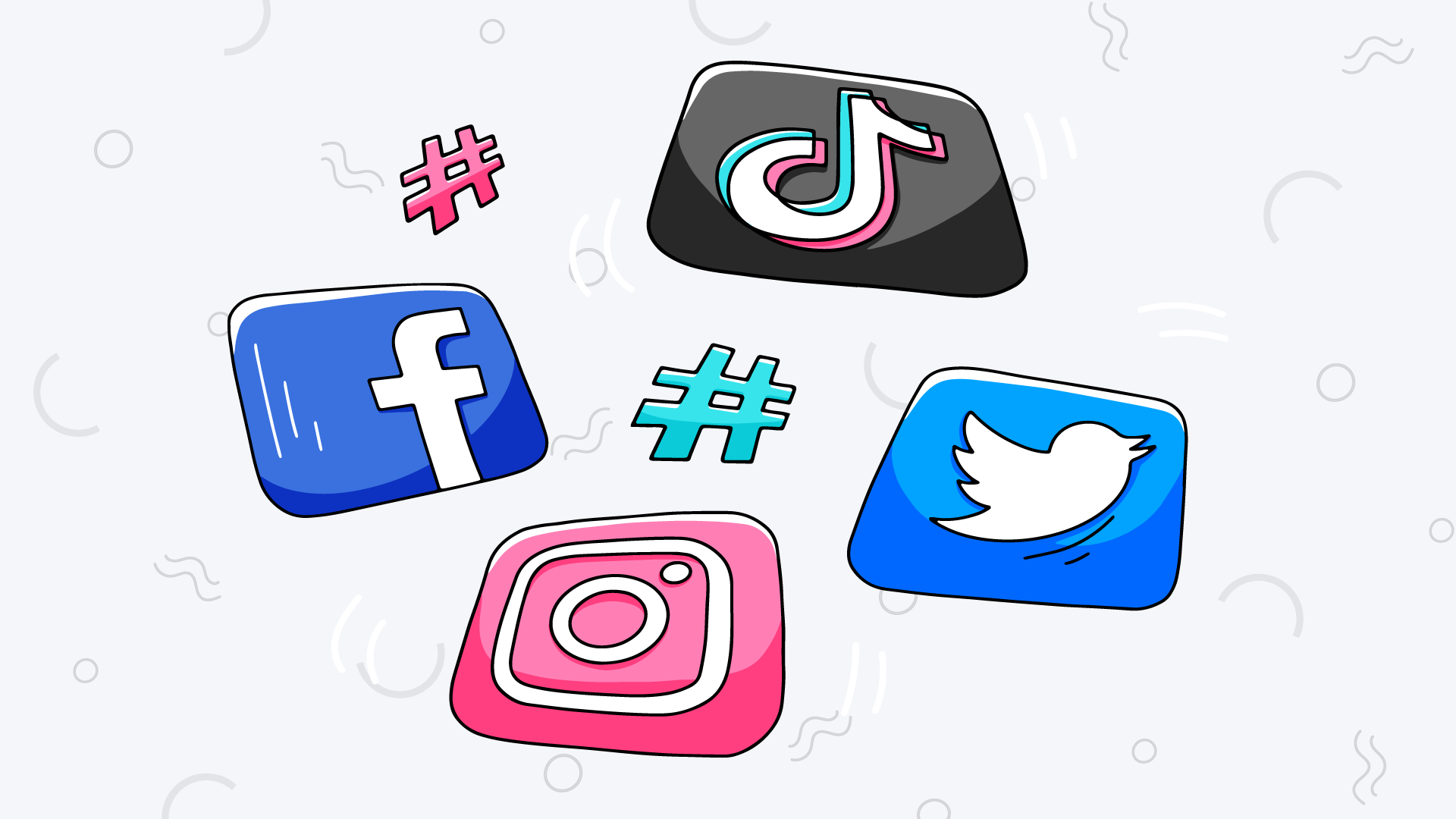
Other people's social media coverage can draw attention to your business too. Your brand should get positive PR gains when friends, followers and even influencers in your industry share your LinkedIn, Facebook and Instagram posts. It's even better when they post genuine reviews of your services and products.
Attending industry events and trade shows is another excellent way to get mentions on other people's social media, especially if you're a B2B business. Ways to boost your PR efforts at industry events include hosting an exhibit, being a speaker, or simply chatting and extending your network.
Influencers

Forging relationships with influencers in a specific niche where you share a similar target audience is another excellent way to get more eyes and ears on your company. You can work with influential bloggers, podcast influencers, social media outlets, YouTube influencers and more to get your company some positive vibes.
As a small business, you're unlikely to attract the so-called mega influencers with their one million+ followers. Instead, look for nano and micro-influencers in your niche. These are the influencers with small but passionate audiences.
Add value to Instagram, Snapchat or Facebook posts by asking social influencers to try a product or tool - if they like it, they might write about it. Social media works both ways, too. If you mention them in one of your posts, they might share it, which could help your business gain more exposure on social media.
Pitch yourself to podcasts as a guest. Podcast appearances allow you to tell your story and offer value to an audience in your niche or industry. Being of service and giving immense value are two of the best ways to enhance your public relations profile.
Wondering where to find the right influencers? Learn how to do it (starting with a free trial) in how to find a podcast influencer. And if the very idea of pitching podcasts, local newspapers, or anything else seems daunting, read our how-to-pitch a podcast article for tips on the best approaches.
Philanthropy

Small businesses are the vital cogs in their communities, so participating in community events positively impacts your local profile. Charitable work that is linked to what your business does is also good for word-of-mouth promotion. (Putting out a press release about your efforts can gather some excellent publicity too.)
You'll find hundreds of opportunities to help a cause and raise public perception of your business. Some ideas include:
- Participating in charitable fun runs
- Contributing to local festivals (and encouraging other businesses to join in.)
- Contacting the local high school or church to discuss how you can help with their outreach programs.
- Offer a free service to local charities. For example, if you're a food business, you can donate the day's leftovers to the local food bank. If you work in budgeting, offer free advice sessions to low or middle-income families.
- Donate your time to a community beach or park clean-up. You could also offer prizes for individuals or teams that collect the most trash or sponsor a barbeque lunch.
Getting involved in philanthropic works sends positive messages about your small business and helps the community at the same time. If you're seriously considering working with a charity, but don't know which one to choose, talk to local counselors, pastors and leaders or consult websites like Charity Navigator.
Social media presence

Create and post authentic stories that reflect your brand values and mission on the social sites where your customers hang out. Write about all those donations and sponsorships and why (and how) you chose to help.
Put customer testimonials onto your website and social platforms. Sharing people's positive reviews helps other potential customers decide to buy from you rather than other businesses.
To learn more about user-generated content, check out this helpful guide from Sprout Social.
How to create a successful PR strategy

Know your audience
A good PR campaign begins with knowing and understanding your audience because you want your message to fall in the right ears. For example, if your business sells products and services to schools, you want to build your reputation in the education community.
If you're a solo bookkeeper catering to small business owners, you might target tax season as a valuable time to be helpful. On the other hand, a small business selling costumes and props could work with parents and kids, adult partygoers and festival fans, or even theatre companies, three unique audiences with very different needs.
Define your goals

The Small Business Chronicle has an excellent explanation of the difference between goals and objectives. In a nutshell, goals are large and relatively undefined. Objectives hone in on specifics.
So, if your small business makes custom surfboards, your public relations goals may be general things like "raising awareness of our business in the surfing community." Or they could be slightly more targeted, e.g., "providing information about our boards to teenage surfers."
PR objectives related to those general goals could be related to community events. For example, "we aim to raise our profile among teenage surfers by hosting free surfboard maintenance workshops at five local high schools."
Choose a couple of tactics to focus on
PR tactics take time and effort and will overwhelm you if you try to do everything at once. Instead, consider your goals and objectives; which strategy would suit them best? Then consider your talents and the time you have to give.
Is writing one of your strengths? You might offer to write a regular article series for local news outlets. That helps establish your expertise and thought leadership reputation.
Do you have an extensive network in your industry or local area? Perhaps dropping positive story ideas to local reporters would help establish good public relations with the local press.
Or, perhaps there's a community festival planned. Does it make sense to offer your services there?
Evaluate
Remember to stop and take stock of the results of your PR campaign.
- What went well?
- You're bound to make a few mistakes, so what lessons have you learned?
- Did you achieve your objectives?
- And what should you focus on next?
Repeat
Build on your PR efforts by regularly rotating through the audience-goal definition-enact tactics-evaluate strategy cycle.
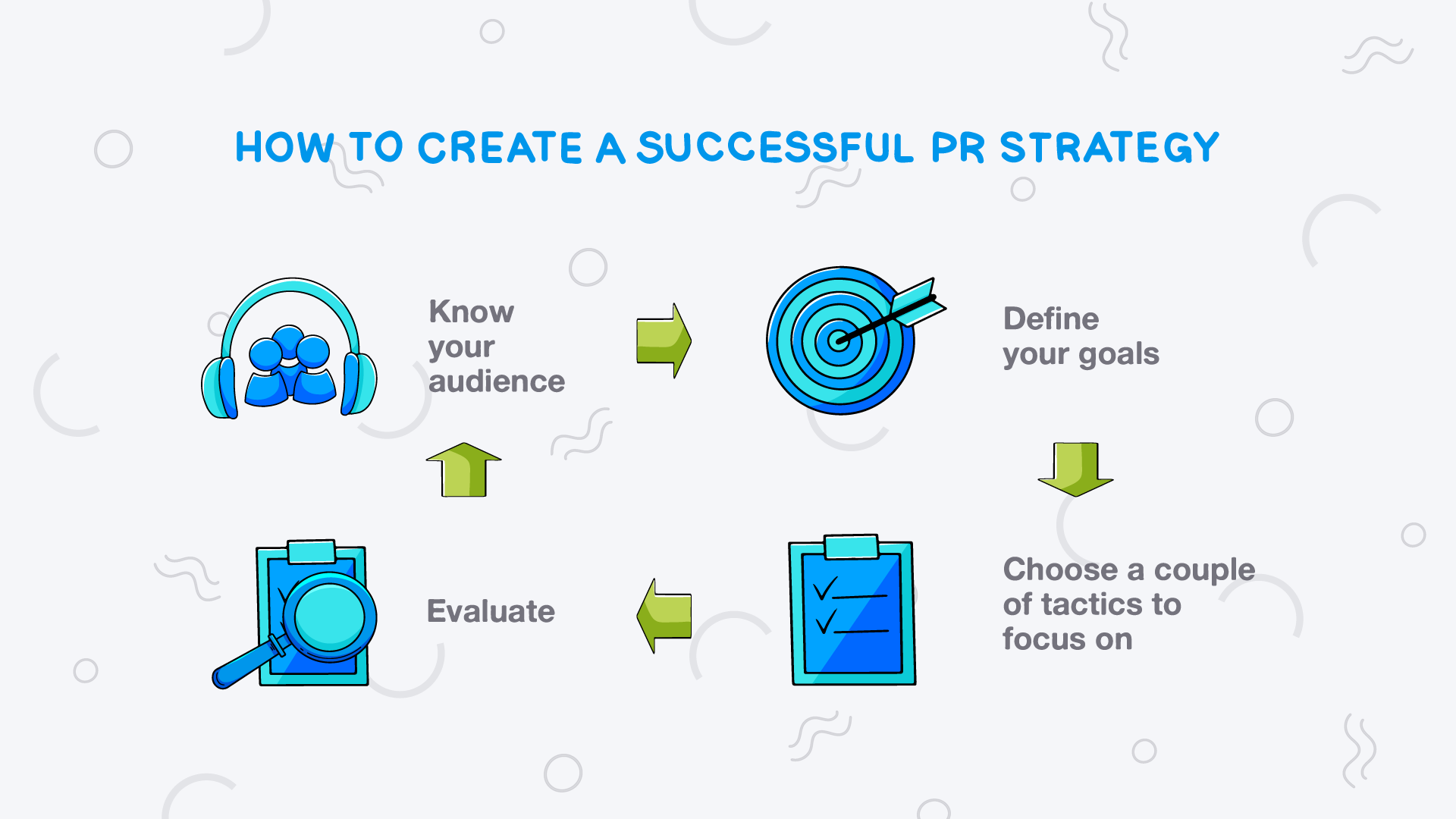
Best free PR tools
Rephonic Graph Tool: if you know of a podcast that attracts people in your industry or your customer base, use our 3D graph tool to discover podcasts with similar audiences. Simply type in the podcast name, and the graph displays many related podcasts. Click on an image to learn more about the podcast.
Buzzsumo: This platform helps you see social media influencers and online content gathering shares, comments and engagement on websites, social media and community sites like Reddit. The site offers a limited free plan or a 30-day trial of the full experience.
Google Alerts: set up to 1000 topics on Google Alert, and Google will send you an email whenever new results appear in Google search. You can set Google Alerts to monitor mentions of your brand, company, competitors or any other relevant search term. Check out this Guide to Google Alerts for more details.
Mention: similar to Google alerts, Mention monitors multiple sources, including social media, but goes further with tools that help you filter and analyze the data and create a publishing schedule. Mention allows a free 14-day trial before going onto a paid plan.
Qwoted: helps small businesses, solopreneurs and more connect with journalists to become a trusted expert source. Qwoted's Basic Plan is free but limited, allowing two monthly searches.
Hunter: an excellent tool to help you find or verify professional email addresses. Hunter's free service allows 25 searches and 50 verifications per month.
Submit.co: this free tool from Betalist is a list of media that give press coverage for startups.
Anewstip: searches for relevant media contacts based on information from their news articles or tweets. It has a basic free plan and a 14-day free trial of its paid plans. Here's a video that walks you through the four main ways to use Anewstip.
Final thoughts
Now that you've read our guide to pr ideas for small business, take some time to plan your PR tactics. Start with the ideas that most resonate for your business, talents or interests because they're more likely to generate enthusiasm in your team. Look for ones you can do more than once and streamline the process.
Once you've gained confidence, branch out into the less familiar ideas, decide which ones make sense for your business, and make an implementation plan.
Doing your own pr work won't be easy, but it can be extremely rewarding to let people know about the positive impact you're making in the world.

